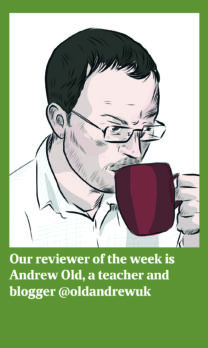Blog reviewer Andrew Old shares his top edu-blogs this week
How is the evidence revolution going? Some reflections on 4 years of researchED
@tombennett71
Four years ago, a teacher named Tom Bennett started the researchED movement: a series of conferences enabling teachers and researchers to discuss the evidence base for the teaching profession.
Here he discusses his motivation for setting it up and its growth since then. He also comments on the many controversies on using research to inform classroom practice.
Teaching is all about relationships (kind of)
@greg_ashman
Maths teacher Greg Ashman discusses the oft-heard claim that teaching is all about relationships.
While noting that this might be one of those statements that can be interpreted either to be trivially true or as something contentious with great implications, he suggests ways in which it may tell us something useful about how we approach teaching, such as how we set out desks and how we make explanations.
An angry blog post about Great Yarmouth Charter Academy
@Kris_Boulton
Kris Boulton visited a school in Great Yarmouth and was very impressed by what he saw. He was impressed to see excellent behaviour and noticed how happy both staff and students were. But he was furious to see how this compared with the claims made by the school’s critics, who had repeatedly suggested it was an oppressive, hateful place rather than “the next great success story” and a source of hope that any school can be turned round.
What makes the difference? (Part 2)
@EnserMark
This post describes a successful geography department. The head of that department tries to identify what makes it work well. While he doesn’t really give much advice for getting to where they are, he does suggest that their success comes from the attitude and behaviour of the students, challenging content at key stage 3 and the way that everyone seems happy.
Oven-ready, Hello Fresh or Just Eat? What’s the beef about pre-planned lessons?
@ClareSealy
A primary school headteacher discusses “preplanned” lessons.
She discusses both the objections and the benefits, and the extent to which teacher autonomy in the delivery can be allowed. She emphasises that what is needed is a coherent curriculum and staff who are trained to use the resources.
I wish I taught maths
@jo_facer
This post by English teacher Jo Facer is not something those of us who teach maths are used to reading: recognition that it is a great subject to teach.
She discusses her fondness for the subject but also what she learned from reading a recent book about maths teaching and how it reignited her interest in the subject. “…I will continue to lurk in maths classrooms, and lend [Craig] Barton’s book to everyone I know who actually does teach Maths (and to a few people who don’t)”.
Traditional practices are not going anywhere
@JohnKenny03
An Australian primary teacher discusses “traditional practices” in teaching.
He argues that for all we hear about how schools will need to be different in the future, we will always need to know some basic facts and we will always need to engage with the past rather than flee from it. “If we want kids to do great things, they need to build on basic concepts – basic concepts that have been part of traditional teaching practices for decades.”
Infer this…
@DTWillingham
This post, written by a cognitive psychologist, discusses the latest evidence about the teaching of comprehension strategies in reading.
It argues that although there are demonstrable benefits from such strategies, “practicing inferences does not lead to a general inferencing skill”. Additionally, comprehension strategies are not of equal use to all readers, and beyond a certain level of instruction and practice, spending more time learning to infer from a text may not grant any additional gains.













Your thoughts